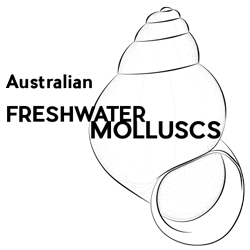
There are two species of Tatea, both have elongate shells and the adults have a thickened aperture and the operculum bears several pegs. T. huonensis has a broader shell than T. rufilabris, the spire has a straight outline and the last whorl is less angulate at the periphery.
Tatea huonensis (Tenison Woods, 1876)
Class Gastropoda
Infraclass Caenogastropoda
Order Littorinida
Suborder Rissoidina
Superfamily Truncatelloidea
Family Tateidae
Genus Tatea Tenison Woods, 1879
Original name: Bythinia huonensis Tenison Woods, 1876. In Woods, J. E. Tenison (1876). On the freshwater shells of Tasmania. Papers and Proceedings of the Royal Society of Tasmania 1875: 3 - 89.
Type locality: Huon River, Tasmania.
Synonyms: Tatea paradisiaca Pilsbry, 1897; Tatea ballina Iredale, 1943.
In leaf litter, under logs, rocks, etc. amongst mangroves, in salt marsh and along river banks in estuaries and coastal lagoons. Often abundant. Assumed to feed on microalgae and bacteria. Solitary, sand-covered hemispherical capsules with single egg. Development includes a short planktotrophic phase.
From southern Queensland to southern Western Australia and Tasmania.
Tatea differs from other tateids in having the following combination of characters: a protoconch of two whorls consisting of protoconch I and II (not about 1.3-1.7 whorls with no protoconch 11), a black pigment ring around the distal end of the cephalic tentacles, and the female genital opening located beneath the middle of the capsule gland. It differs from nearly all in having more massive opercular pegs and a thicker operculum. In addition, Tatea has several small ciliated folds on the left cephalic tentacle, a feature that is absent in related freshwater taxa.
Ponder, W. F., Colgan, D. J. & Clark, G. A. (1991). The morphology, taxonomy and genetic structure of Tatea (Mollusca: Gastropoda: Hydrobiidae), estuarine snails from temperate Australia. Australian Journal of Zoology 39: 447-497.
Ponder, W. F., Clark, S. A. & Dallwitz, M. J. (2000). Freshwater and estuarine molluscs: an interactive, illustrated key for New South Wales. Melbourne, CSIRO Publishing.
Robinson, K. & Gibbs, P. (1982). A field guide to the common shelled molluscs of New South Wales estuaries. Sydney, Coast and Wetlands Society.